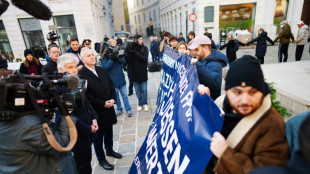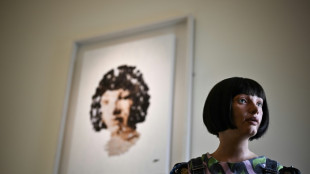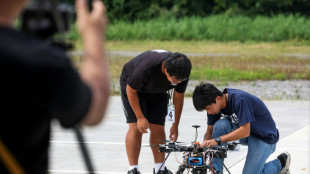-
 Bangladesh outspin Afghanistan to level ODI series
Bangladesh outspin Afghanistan to level ODI series
-
Monaco claim comeback win to retake second spot in Ligue 1

-
 'Way too far': Amsterdam in shock after 'frightening' violence
'Way too far': Amsterdam in shock after 'frightening' violence
-
Bonzi fells Norrie in Metz for first ATP title

-
 Biden, Trump to meet at White House ahead of historic return
Biden, Trump to meet at White House ahead of historic return
-
Jorgensen the hero as Australia edge England in Twickenham thriller

-
 Vinicius treble as Real Madrid crush Osasuna, Villarreal rise
Vinicius treble as Real Madrid crush Osasuna, Villarreal rise
-
A 'jungle': Rome's teeming jail lays bare Italy's prison ills

-
 Asalanka knock seals four-wicket Sri Lanka win over New Zealand
Asalanka knock seals four-wicket Sri Lanka win over New Zealand
-
Australia beat England 42-37 in Twickenham thriller

-
 Wolves end wait for Premier League win, Man City aim to snap losing streak
Wolves end wait for Premier League win, Man City aim to snap losing streak
-
Gaza mediator Qatar bows out, source says, in sign of impasse

-
 Musiala stars as Bayern go six clear, Dortmund lose again
Musiala stars as Bayern go six clear, Dortmund lose again
-
'Racing career: completed it!' announces cycling great Cavendish

-
 Waring holds one-shot Abu Dhabi lead as McIlroy struggles
Waring holds one-shot Abu Dhabi lead as McIlroy struggles
-
Vinicius treble helps Real Madrid crush Osasuna

-
 Iran urges Trump to change 'maximum pressure' policy
Iran urges Trump to change 'maximum pressure' policy
-
Goal-shy Lecce fire coach Gotti

-
 Comeback king 'Cav' set a benchmark doing the thing he loved
Comeback king 'Cav' set a benchmark doing the thing he loved
-
UK's Queen Camilla to miss events as Kate returns to public life
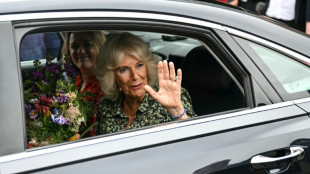
-
 Cycling great Cavendish announces retirement
Cycling great Cavendish announces retirement
-
Rome's Trevi Fountain unveils tourist catwalk during cleaning

-
 Defence puts a smile on All Blacks faces ahead of French Test
Defence puts a smile on All Blacks faces ahead of French Test
-
Kagiyama wins NHK Trophy despite early slip

-
 Afghan women not barred from speaking to each other: morality ministry
Afghan women not barred from speaking to each other: morality ministry
-
China's Xi hails 'new chapter' in relations with Indonesia

-
 Injured Darry out of All Blacks tour with Cane in doubt
Injured Darry out of All Blacks tour with Cane in doubt
-
Pakistani separatists kill 26 in railway station blast

-
 China's Xi meets Indonesian president in Beijing
China's Xi meets Indonesian president in Beijing
-
Key nominees for the 2025 Grammy Awards

-
 Top art collector displays rare treasures in Madrid
Top art collector displays rare treasures in Madrid
-
Pakistani separatists kill 25 in railway station blast

-
 South Sudan floods affect 1.4 million, displace 379,000: UN
South Sudan floods affect 1.4 million, displace 379,000: UN
-
Japan's Sasaki set to follow Ohtani with move to MLB

-
 Konstas hits unbeaten 73 in audition to open for Australia
Konstas hits unbeaten 73 in audition to open for Australia
-
Pakistani separatists kill 22 in railway station blast

-
 No culprit found five years on from Notre Dame fire
No culprit found five years on from Notre Dame fire
-
Reeking mud sparks health fears in Spain flood epicentre

-
 Bogusz goal edges LAFC past Whitecaps in MLS playoffs
Bogusz goal edges LAFC past Whitecaps in MLS playoffs
-
N. Korea jams GPS signals, affecting ships, aircraft in South

-
 Indonesia volcano catapults vast ash tower into sky
Indonesia volcano catapults vast ash tower into sky
-
Cavs ride huge first half to crushing win over Warriors

-
 Over 130 homes lost in California wildfire as winds drop
Over 130 homes lost in California wildfire as winds drop
-
New tools give researchers hope for fungus-ravaged US bats
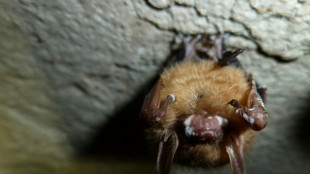
-
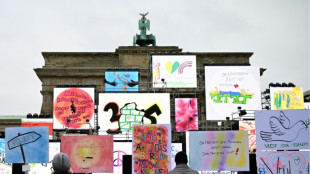 Germany marks 1989 Berlin Wall fall with 'Preserve Freedom' party
Germany marks 1989 Berlin Wall fall with 'Preserve Freedom' party
-
Heat, air pollution, disease: How climate change affects health
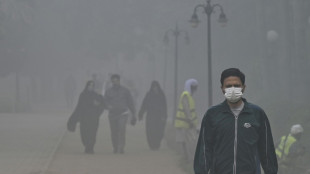
-
 Boeing to face civil trial over 2019 MAX crash
Boeing to face civil trial over 2019 MAX crash
-
Over 130 homes lost in California wildfire as winds abate for now

-
 'No excuses', says Farrell after All Blacks end Irish home win streak
'No excuses', says Farrell after All Blacks end Irish home win streak
-
Furious de Zerbi talks of leaving after Marseille lose to Auxerre

The five scientists who won two Nobel prizes
American Barry Sharpless on Wednesday became only the fifth person ever to win a second Nobel Prize, two decades after being awarded his first.
AFP looks at the four other people who received the illustrious award twice for their services to mankind:
- Marie Curie (1903, 1911) -
The mother of modern physics was the first woman ever to win not one, but two, Nobel prizes for her seminal discoveries in physics and chemistry.
Born Maria Sklodowska in Poland, Curie moved to Paris as a student and is famed for having isolated the elements of polonium and radium as well as for promoting radium to alleviate suffering.
In 1903, she was awarded the Nobel Prize in Physics, along with her husband Pierre Curie and French physicist Antoine Henri Becquerel for their research into spontaneous radiation.
A second Nobel followed in 1911, this time for chemistry, when Curie was honoured alone for her work on radioactivity.
- Linus Pauling (1954, 1962) -
Linus Pauling, the US chemist who posited that huge doses of vitamin C can ward off the common cold, is the only person to have been awarded two unshared Nobel Prizes – the 1954 Nobel Prize in Chemistry and the 1962 Nobel Peace Prize.
Pauling won his first Nobel in 1954 for his work in molecular chemistry, particularly in the field of proteins and anti-bodies.
His second award came eight years later in 1962 was in recognition for his campaigning against nuclear testing.
- John Bardeen (1956, 1972) -
US engineer John Bardeen shared the Nobel Prize in Physics twice.
In 1956, he and two colleagues at Bell Labs, William Shockley and Walter Brattain, won for inventing the transistor, which revolutionised the field of electronics by leading to smaller and cheaper radios, calculators and computers, amongst other objects.
In 1972, he picked up his second Nobel for developing the BSC-theory of superconductivity, with fellow American physicists Leon Cooper and John Robert Schrieffer.
- Frederick Sanger (1958, 1980) -
British biochemist Frederick Sanger, dubbed the father of genomics, was the only person to win the chemistry Nobel twice.
Sanger was the sole winner of the prize in 1958 for his work on the structure of proteins, notably insulin, and then shared it with two others, Paul Berg and Walter Gilbert of the United States, in 1980 for pioneering developments in DNA sequencing that are still being used today.
His work allowed long stretches of DNA to be rapidly and accurately sequenced and was central to the Human Genome Project's mammoth achievement in mapping more than three billion units of human DNA.
- ICRC and UNHCR -
Two organisations have won multiple Nobel Peace Prizes.
The International Committee of the Red Cross won in 1917, 1944 and 1963 and the Office of the UN High Commissioner for Refugees won in 1954 and 1981.
A.Malone--AMWN
